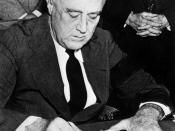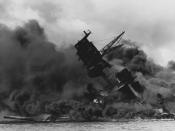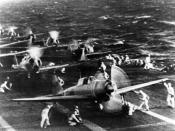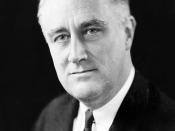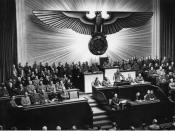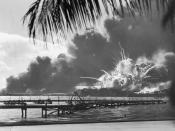There are always differences in opinions when studying history in any period of time.
President Franklin Roosevelt was often the target of critics and praise-makers both beforeand after Pearl Harbor. Nobody knows what really happened on December 7, 1941. It willremain to be discussed whether FDR knew about the attack or he was unaware of it.
On 7 December 1941 the greatest disaster in United States history occurred. The attackon Pearl Harbor was a surprise military strike conducted by the Japanese navy against theUnited States' naval base at Pearl Harbor, Hawaii, on December 7, 1941, later resulting in theUnited States becoming militarily involved in World War II. The attack consisted of two aerialattack waves totaling 353 aircraft, launched from six Japanese carriers. The attack sankU.S.Navy battleships and damaged a lot more. The attack was a major engagement of WorldWar II. The attack, and especially the ÃÂsurpriseÃÂ nature of it, were both factors in changing U.S.
public opinion from the isolationist position of the mid-1930s to support for direct participationin the war. Japanese losses were minimal but American losses were huge. This attack causedpeople to divide into two sides. But at the same time both accept that U.S. had broken Japanesecode. What they had broken were diplomatic codes. The messages sent on December 6th made itperfectly clear to Roosevelt that the Japanese government was planning to declare war upon theUnited States.
One group of people think that FDR was a traitor for maneuvering Japan into war withUS and for sacrificing American lives, for putting America in danger, for using theConstitutional power of Congress to make war. They say that FDR knew about the attack onPearl Harbor and did nothing to prevent this. In a his game Franklin D. Rooseveltsacrificed over 2400 American SeamenÃÂs lives, thanks to his power as Commander in Chief ofthe Armed Forces. By overlooking the obvious facts of an attack by Japan on Pearl Harbor,Roosevelt was able to control both the political and economic systems of the United States. Mostof American society before the Pearl Harbor bombing believed in the idea of isolationism.
Franklin D. Roosevelt knew this, and knew the only way in which United States countrymenwould take arms and fight in EuropeÃÂs War was to be an overt action against the United States bya member of the Axis Power. Roosevelt also believed Hitler would not declare war on the UnitedStates unless he knew they were beatable. People express harsh criticism of FDR because of hispassive actions before the attack. They criticize FDR because he knew that there were many keymilitary needs that were missing from Pearl Harbor, and they were: a lack of training facilities,lack of large-scale ammunition and fuel supplies, lack of support craft such as tugs and repairships, and a lack of overhaul facilities such as dry-docking and machine shops. FDR justsacrificed those people for being involved in the World War II. Oppositionists do not doubt PearlHarbor was President Franklin D. RooseveltÃÂs back door into the European War. RooseveltÃÂsdecisions and actions were very much so, deliberate and calculated, in order to lead a victoriousAllied Powers in World War II. By provoking the Japanese and the foreknowledge of an attackon Pearl Harbor, Roosevelt along with his top advisors and the Federal Government are truly toblame for the lost of American lives and American property.
Others think that FDR was unaware of the time and place of the attack. The supporters ofFDR say that the only thing he knew was that Japan was going to attack, but he did not knowwhere and when. Even though FDR got the message the Japanese government was not in thehabit of informing its diplomats of planned military strikes in detail. So while the Americansknew that Japanese diplomats had been instructed to deliver a certain message to the U.S.
government they did not know where to expect the initial attack. To prove their point they citedthe report which found that ``the evidence of the handling of [the intercepted Japanese] messagesin Washington reveals some ineptitude, some unwarranted assumptions and misestimations,limited coordination, ambiguous language and lack of clarification and follow-up at higherlevels.''. The Pacific Ocean's a big place, and there were lots of targets available to the Japanese-the Philippines, Dutch East Indies, Singapore, etc. People affirm that their oppositionists are fullof speculation because the evidence that FDR knew that Pearl Harbor would be attacked seemsto be lacking. There really isn't enough evidence to say if the Roosevelt Administration knew ofa coming attack on Pearl Harbor. It is not possible to believe that Roosevelt was willing tosacrifice most of the Pacific fleet, and possibly one of the most important American naval basesin the Pacific, probably crippling American operations against Japan for the next two years inorder to gain public support to become involved into the war. They don't think the evidentialchain is strong enough to reach the conclusion that the White House let the attack happenbecause that would seem like a crazy thing to do from the American point of view. They say thatFDR is not to blame.
We cannot learn the truth about what happened a half-century ago. The truth we owe themen of Pearl Harbor. Even if we learn the full truth, we will still honor them and every soldierand sailor who gave their life for their country. The US was warned by, at least, the governmentsof Britain, Netherlands, Australia, Peru, Korea and the Soviet Union that a surprise attack wascoming. All important Japanese codes were broken. FDR and Marshall and others knew theattack was coming but we still do not know whether peopleÃÂs lives have been sacrificed fortreason or it was an attack that no one could escape.
Bibliographyhttp://www.history.navy.mil/photos/events/wwii-pac/pearlhbr/pearlhbr.htm -The description ofthe attackhttp://plasma.nationalgeographic.com/pearlharbor/ - memories about Pearl Harbor and thedescription of the attackhttp://www.eyewitnesstohistory.com/pearl.htm - The description of the attackhttp://www.nps.gov/usar - Sharing Stories and the description of the attackhttp://www.historyplace.com/worldwar2/timeline/pearl.htm - time schedule of the attack onPearl Harbor
